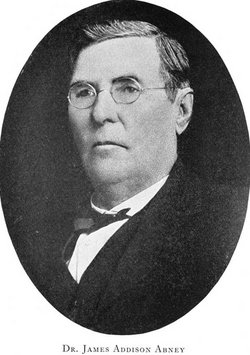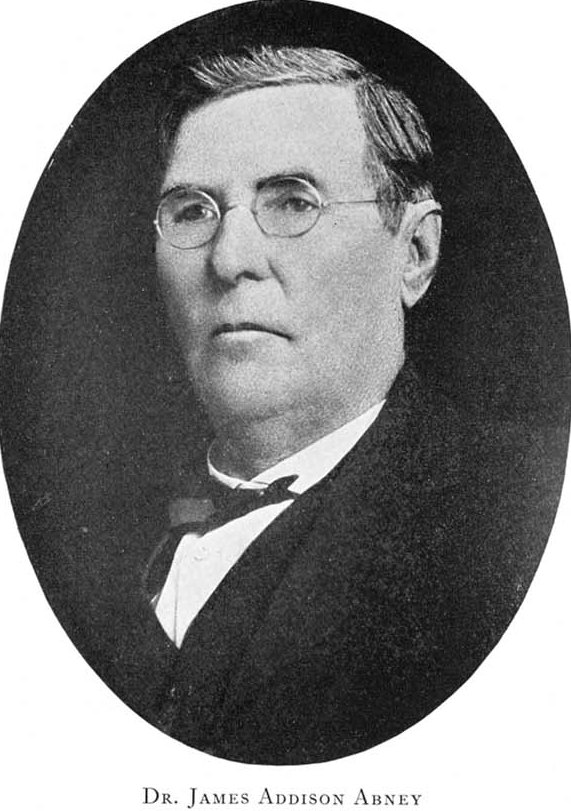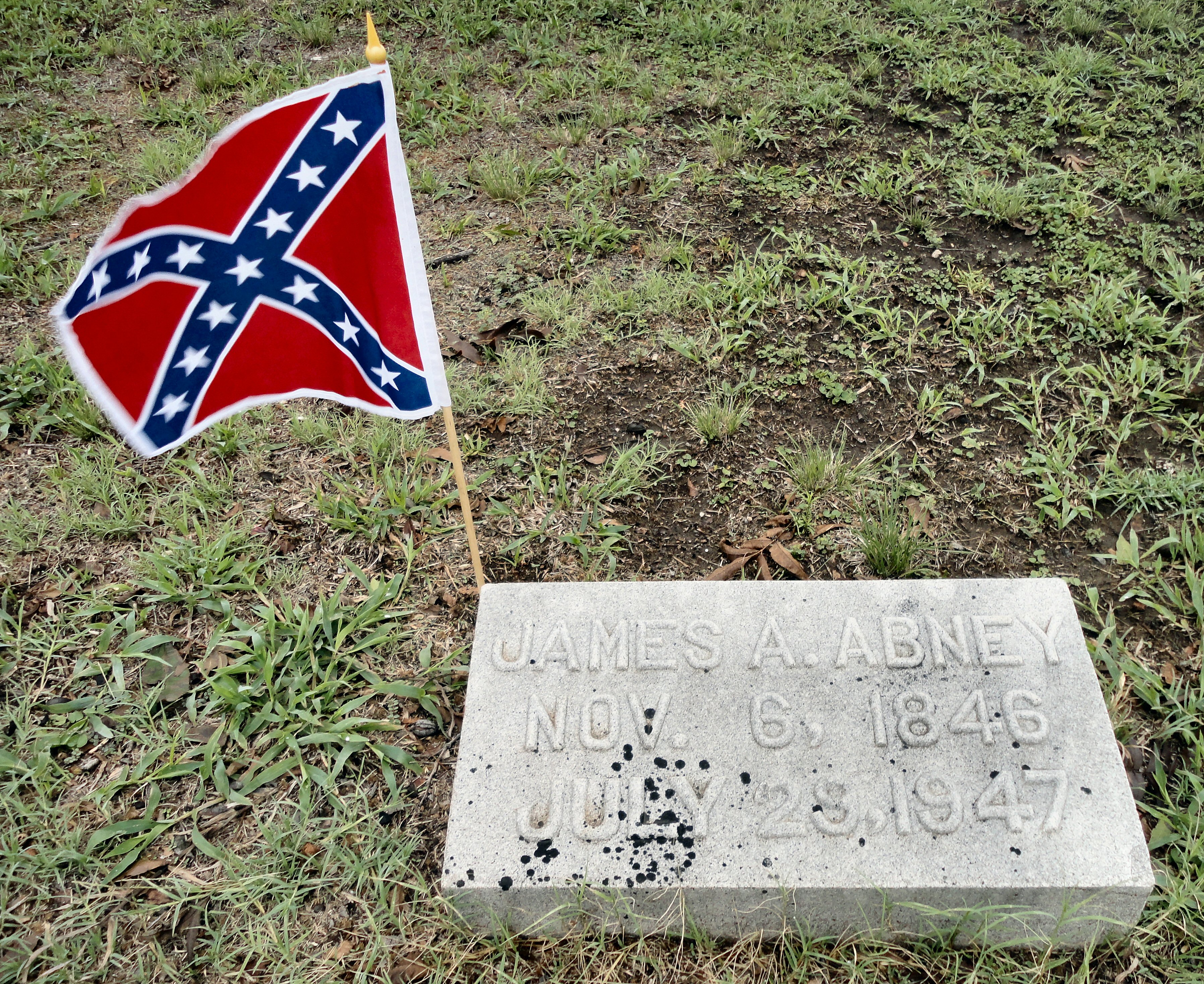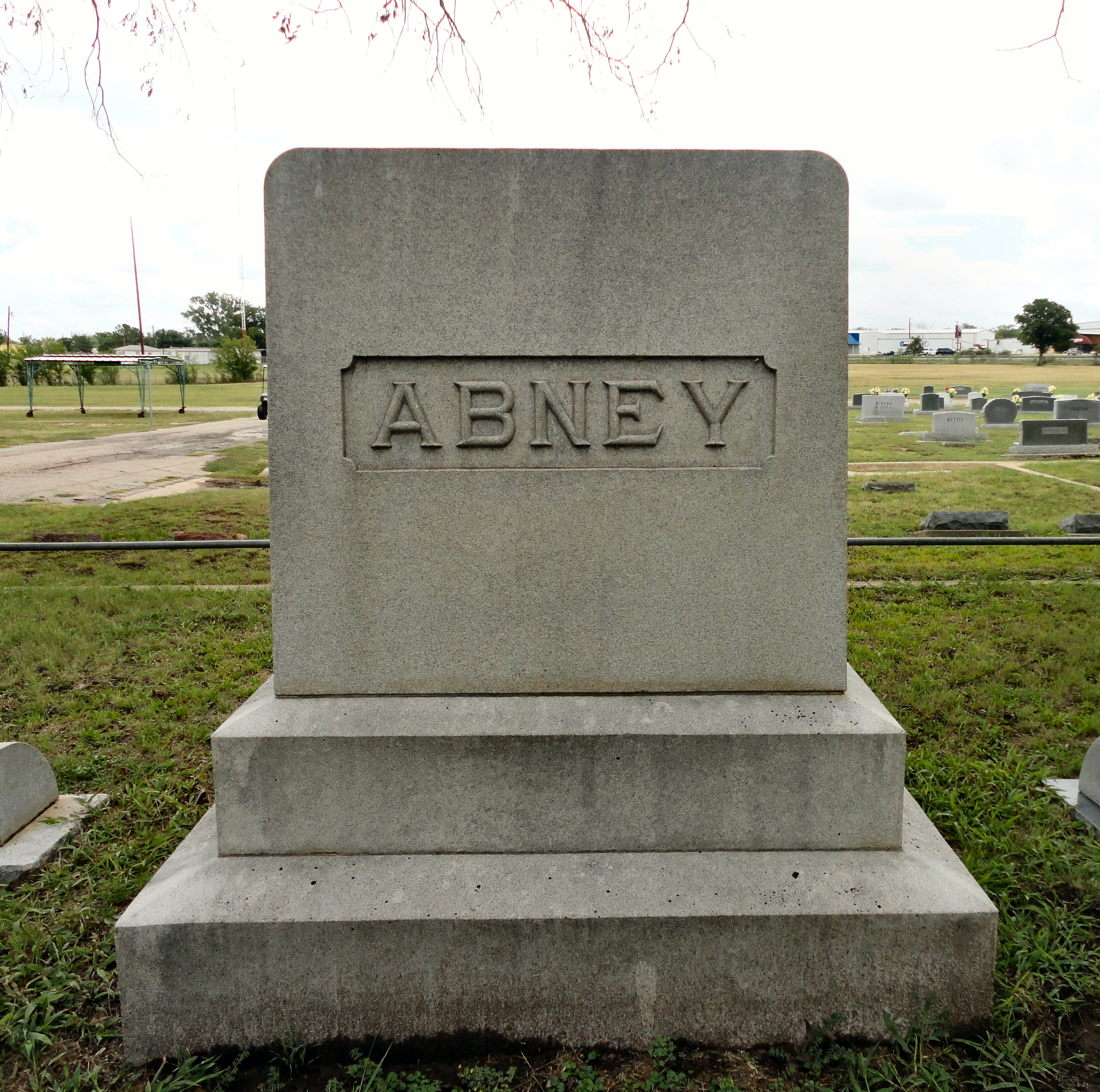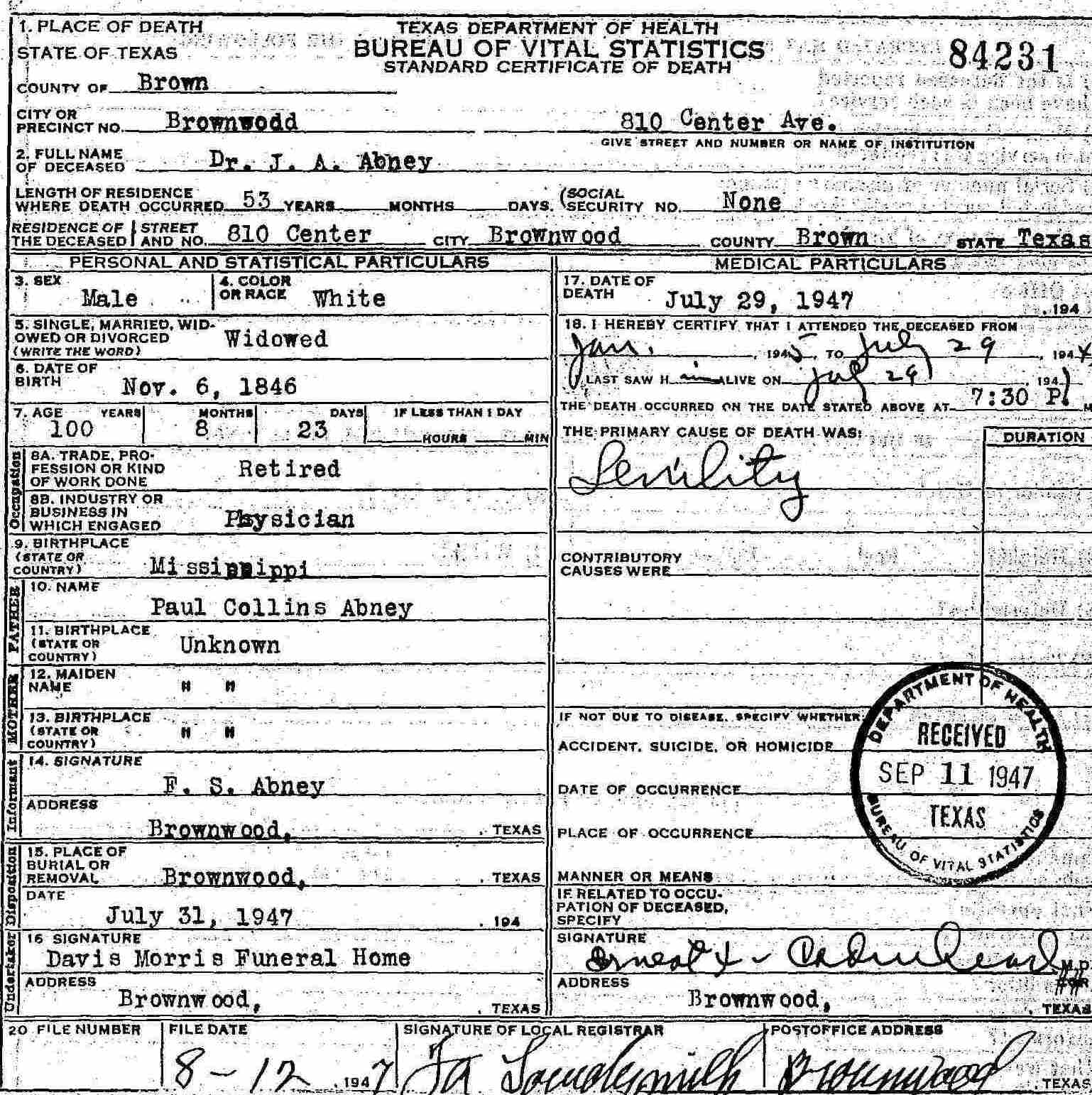Patricia Holm, "ABNEY, JAMES ADDISON," Handbook of Texas Online
ABNEY, JAMES ADDISON (1846–1947). James Addison Abney, physician and legislator, was born November 6, 1846, in Neshoba County, Mississippi. He was the oldest of twelve children of Paul and Margaret Abney. The family moved from St. Helena Parish, Louisiana, to Angelina County, Texas, in 1853 and settled in Homer. Paul Addison farmed the land and worked to become a surveyor, eventually acquiring a sizeable estate after enduring years of poverty. The Abneys built a subsequent home in Lufkin, which stood on the site where the Texas Foundries later arose. Margaret organized a Sunday school in Lufkin that later became the First Methodist Church in 1882.
James "Big Jim" Abney joined the Confederate Army in the spring of 1864, under Captain H.G. Lane, in Company E, John Pelham Border's Battalion, Thomas Scott Anderson's Regiment. James served as a guard at Camp Ford near Tyler, Texas, a stockade for Union soldiers. At the end of the war, he went home penniless and barefoot.
James married Susan (Susanna) Elizabeth Davis, a member of Confederate President Jefferson Davis's family, on December 10, 1868, on the courthouse square of Homer, Texas. Together, they had three children that survived to adulthood and one child who died at birth in 1869.
James worked as a physician after years of personal tutoring from Angelina County's only doctor at the time, Dr. Manning, and registering with the medical branch of Soule University in Galveston in October 1869. James "Dr. Jim" Abney received his diploma on March 2, 1871, and established a practice in Homer. In 1891 he completed post graduate coursework at Tulane Medical School in New Orleans.
James and Susanna's home was located on North First and Bremond in Homer, Texas, the future location of the Lufkin Telephone Exchange. James shared ownership of one of the earliest drugstores in Lufkin, called Abney & Scurlock, Druggists, with J. M. Scurlock, which opened for business on October 1, 1887.
Dr. Jim often acted as a spokesman against the saloons in Homer, which the Christian community felt held an air of moral decay. Because of his status as a doctor and business owner in the community, Dr. Jim was asked to give a welcome speech for promoters of the new Houston East and West Texas Railway Companyqv, scheduled to be routed through Homer. Abney declined when he discovered that the promoters were saloon owners. Apparently bitter over the whole affair, the train owners rerouted their line through Lufkin. The economic significance of Homer soon declined which angered many Homer citizens, who relocated to Lufkin in search of a better economic outlook. Dr. Jim and his family were among them.
Abney briefly served in the Twelfth Texas Legislature for District Two (Angelina, Shelby, Sabine, Nacogdoches, Trinity, and San Augustine counties) under Governor Edmund J. Davis and Speaker Ira H. Evans.qqv He resigned, however, only a few weeks into the legislative session in February, which led to an election contest between Moses T. Roberts and William Phillips. Both were declared ineligible and the seat remained vacant until October 3–6, 1871, when John Polley won and was sworn in on October 31, 1871.
In March 1892 Susanna's failing health motivated the family to move to Lampasas in the hopes that the mineral springs would help heal her. She died on October 15, 1892, and was buried in Walker Cemetery in Angelina County. Her stillborn son's name, Willie, was inscribed on her tombstone alongside her own.
James married Almonta Huling Bartlett in 1893. In 1895 Abney moved his new family to Brownwood to be near the 2,000-acre ranch estate in Blanket, Texas, Brown County, which Almonta brought into the marriage. James continued his medical practice there and later became owner of a 10,400-acre ranch on Brady Creek, near Eden, Texas, Concho County.
As a ranch owner, Dr. Jim worked in conjunction with the St. Louis and San Francisco Railroad Company (Frisco) to establish the town of Winchell, Texas. He organized the Citizens National Bank with his son, Frederick, in Brownwood in 1906. Dr. Jim spent the remainder of his career in the banking business. He was a lifelong Methodist. He died on July 29, 1947.
BIBLIOGRAPHY:
George Plunkett [Mrs. S. C.] Red, The Medicine Man in Texas (Houston: Standard Printing & Lithographing Co., 1930). Dwight A. Sharpe, "The Abney & Chapman Families of Angelina County, Texas" (http://www.dasharpe.com/geneology/lufkin.htm), accessed September 27, 2006. Charles E. Spellman, ed., Texas House of Representatives: A Pictorial Roster 1846–1992 (Austin: Texas House of Representatives, 1992).
Patricia Holm, "ABNEY, JAMES ADDISON," Handbook of Texas Online
ABNEY, JAMES ADDISON (1846–1947). James Addison Abney, physician and legislator, was born November 6, 1846, in Neshoba County, Mississippi. He was the oldest of twelve children of Paul and Margaret Abney. The family moved from St. Helena Parish, Louisiana, to Angelina County, Texas, in 1853 and settled in Homer. Paul Addison farmed the land and worked to become a surveyor, eventually acquiring a sizeable estate after enduring years of poverty. The Abneys built a subsequent home in Lufkin, which stood on the site where the Texas Foundries later arose. Margaret organized a Sunday school in Lufkin that later became the First Methodist Church in 1882.
James "Big Jim" Abney joined the Confederate Army in the spring of 1864, under Captain H.G. Lane, in Company E, John Pelham Border's Battalion, Thomas Scott Anderson's Regiment. James served as a guard at Camp Ford near Tyler, Texas, a stockade for Union soldiers. At the end of the war, he went home penniless and barefoot.
James married Susan (Susanna) Elizabeth Davis, a member of Confederate President Jefferson Davis's family, on December 10, 1868, on the courthouse square of Homer, Texas. Together, they had three children that survived to adulthood and one child who died at birth in 1869.
James worked as a physician after years of personal tutoring from Angelina County's only doctor at the time, Dr. Manning, and registering with the medical branch of Soule University in Galveston in October 1869. James "Dr. Jim" Abney received his diploma on March 2, 1871, and established a practice in Homer. In 1891 he completed post graduate coursework at Tulane Medical School in New Orleans.
James and Susanna's home was located on North First and Bremond in Homer, Texas, the future location of the Lufkin Telephone Exchange. James shared ownership of one of the earliest drugstores in Lufkin, called Abney & Scurlock, Druggists, with J. M. Scurlock, which opened for business on October 1, 1887.
Dr. Jim often acted as a spokesman against the saloons in Homer, which the Christian community felt held an air of moral decay. Because of his status as a doctor and business owner in the community, Dr. Jim was asked to give a welcome speech for promoters of the new Houston East and West Texas Railway Companyqv, scheduled to be routed through Homer. Abney declined when he discovered that the promoters were saloon owners. Apparently bitter over the whole affair, the train owners rerouted their line through Lufkin. The economic significance of Homer soon declined which angered many Homer citizens, who relocated to Lufkin in search of a better economic outlook. Dr. Jim and his family were among them.
Abney briefly served in the Twelfth Texas Legislature for District Two (Angelina, Shelby, Sabine, Nacogdoches, Trinity, and San Augustine counties) under Governor Edmund J. Davis and Speaker Ira H. Evans.qqv He resigned, however, only a few weeks into the legislative session in February, which led to an election contest between Moses T. Roberts and William Phillips. Both were declared ineligible and the seat remained vacant until October 3–6, 1871, when John Polley won and was sworn in on October 31, 1871.
In March 1892 Susanna's failing health motivated the family to move to Lampasas in the hopes that the mineral springs would help heal her. She died on October 15, 1892, and was buried in Walker Cemetery in Angelina County. Her stillborn son's name, Willie, was inscribed on her tombstone alongside her own.
James married Almonta Huling Bartlett in 1893. In 1895 Abney moved his new family to Brownwood to be near the 2,000-acre ranch estate in Blanket, Texas, Brown County, which Almonta brought into the marriage. James continued his medical practice there and later became owner of a 10,400-acre ranch on Brady Creek, near Eden, Texas, Concho County.
As a ranch owner, Dr. Jim worked in conjunction with the St. Louis and San Francisco Railroad Company (Frisco) to establish the town of Winchell, Texas. He organized the Citizens National Bank with his son, Frederick, in Brownwood in 1906. Dr. Jim spent the remainder of his career in the banking business. He was a lifelong Methodist. He died on July 29, 1947.
BIBLIOGRAPHY:
George Plunkett [Mrs. S. C.] Red, The Medicine Man in Texas (Houston: Standard Printing & Lithographing Co., 1930). Dwight A. Sharpe, "The Abney & Chapman Families of Angelina County, Texas" (http://www.dasharpe.com/geneology/lufkin.htm), accessed September 27, 2006. Charles E. Spellman, ed., Texas House of Representatives: A Pictorial Roster 1846–1992 (Austin: Texas House of Representatives, 1992).
Family Members
-
![]()
Sarah Jane Abney McMullen
1848–1927
-
![]()
Nathaniel Searcy Abney
1851–1855
-
![]()
William Albert Abney Sr
1853–1913
-
![]()
Franklin Pierce "Frank" Abney
1856–1939
-
![]()
Dr George Monroe Abney
1859–1929
-
![]()
Peery Collins Abney
1860–1939
-
![]()
Adaline Juliette "Addie" Abney Moore
1863–1958
-
![]()
John Edgar Abney
1865–1907
-
![]()
Emily Zerphina Abney Godbey
1866–1921
-
![]()
Hampton Parton "Hamp" Abney
1869–1938
-
![]()
Carey Collins Abney
1871–1899
Sponsored by Ancestry
Advertisement
Records on Ancestry
Advertisement
